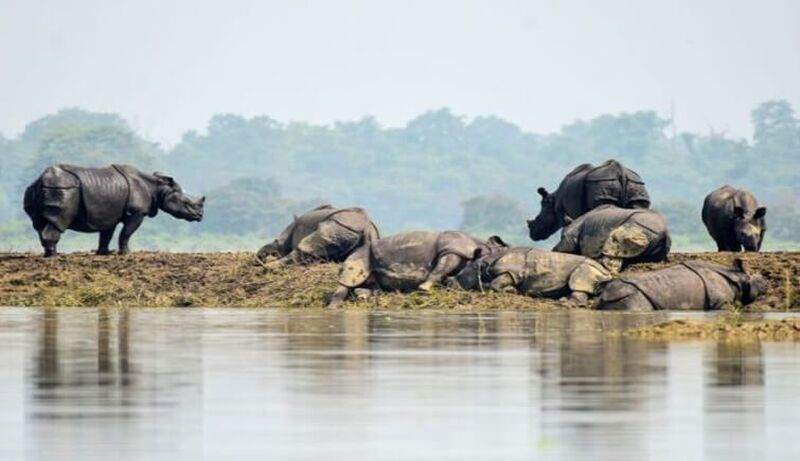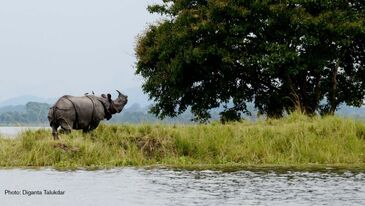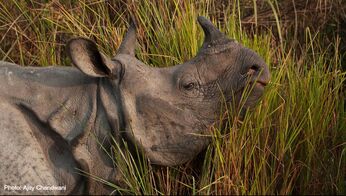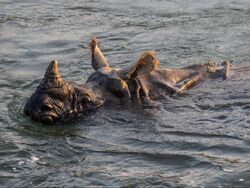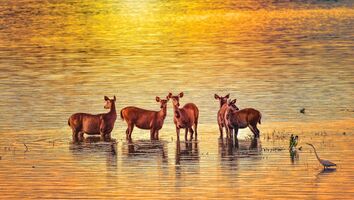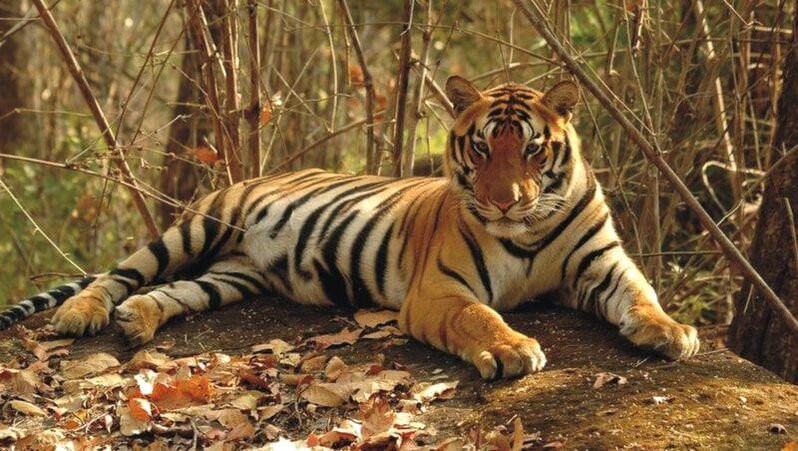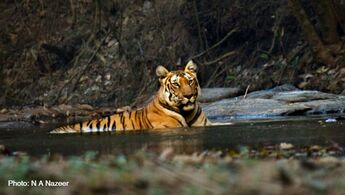Floods threaten rhinos and other wildlife in Assam
India's Kaziranga National Park and Tiger Reserve is home to two thirds of the world's 3,500 last greater one-horned rhinos. But every year between June and September the monsoon floods much of the park, putting the animals at risk from drowning, vehicle collisions, starvation and poaching. Twelve rhinos were among the the 151 animals who died as a result of the flood so far.
India's Kaziranga National Park is a UNESCO World Heritage Site that's famous for hosting the world’s largest population of greater one-horned rhinos. Kaziranga lies in the floodplains of the mighty Brahmaputra river, which overflows and submerges around two-thirds of the park during the annual monsoon. The annual flooding is crucial to sustain the area’s rich plains, which support exceptional biodiversity and fertile agricultural land. But in recent years the flooding has become more severe, causing devastation and loss of life among people and wildlife. Assam reportedly experienced 930 mm of rainfall between 1 June and 1 August; significantly above the seasonal average of 793 mm. Ninety five percent of Kaziranga National Park and 80 percent of Pobitora Wildlife Sanctuary, which boasts the highest density of rhinos in Asia, have been submerged recent weeks. So far, at least 151 wild animals, including 18 rhinos are said to have died in Kaziranga (12 drowned) in connection with the floods. Another rhino died in Pobitora. The rains and the floods are likely to continue until September, so now is the time to help the people fighting for the life of every animal they can protect and save.
|
|
So far, at least 18 rhinos and 135 other wild animals are said to have died in Kaziranga in connection with the floods. Another rhino died in Pobitora. The rains and the floods are likely to continue until September... |
Rhinos are solitary animals and fiercely territorial, but the monsoon flood forces them to crowd together on small elevated hills, which the rising waters have turned into islands. But Drowning is not the only danger that faces Kaziranga’s and Pobitora’s animals during these testing time. With much of their habitat under water, lack of food and hunger adds to the animals’ woes. Desperate for food and high ground, wild animals are more likely to venture into human settlements, fields and tea plantations, which can spark conflicts that easily turn violent or deadly.
To evade the floods, many animals make their way south to the highlands of Karbi Anglong. But to get there, they must cross a busy highway. “Wildlife has the first right of way," says Indian Forest Service official Parveen Kaswan. "Remember they are not crossing the road; the road is crossing the forest.” But not everyone thinks like Mr Kaswan. Cars, trucks and buses fly along the road at breakneck speed day and night. Accidents are inevitable, as scores of exhausted, stressed and hungry elephants, rhinos, small and large deer and other wild animals take their chances. Conflicts with people too become more likely, as the animals move across the densely populated land that surrounds the parks. And then there are the poachers. Armed with machetes and guns, determined to take advantage of the animals’ vulnerability.
High alert around the clock
Colleagues from our Indian partner organisation are assisting the Assam's Forest Department around the clock by enforcing speed limits at crossing points out of the park . They are determined to carry on as long as it takes - in punishing heat, driving rain and amidst the pandemic. Please support them today!
|
|
Cars, trucks and buses fly along the highway day and night. Road safety teams, which include countless volunteers from our Indian partners, work around the clock to slow down traffic and avoid casualties. They need your help to keep going. |
Please support our Assam Flood Emergency Appeal today!
|
Even simple items can greatly ease the work of the volunteers on site.
Your gift will make a real difference and help protect Assam's rhinos, tigers, elephants and other wildlife as they flee the floods in search of food and safety. |
|
Thank you!
|
A Paradise under Water
|
|
This rhino mother and her calf fled to the headquarters of Pobitora Wildlife Sanctuary in search for food. "The floods this time have been very severe, as the rhinos have left the sanctuary," local District Forest Officer Jitendra Kumar told News Live. "I am thankful to the people living in the sanctuary for providing food to the rhinos.”
|
|
|
This mother rhino and her tiny calf make a heart-stopping crossing of the busy highway outside Kaziranga National Park, as they try to reach higher ground. She is even prepared to take on a truck to protect her baby.
|
|
|
An exhausted rhino collapsed on the highway to escape the inundated Kaziranga National Park. Forest rangers and members of the police guarded the rhino, as vehicles maneuvered around the tired animal. The elderly rhino was eventually guided back to the safety of the park, where it was offered vegetation and put under armed guard in the hope that it would regain its strength. |
Latest News
|
|
